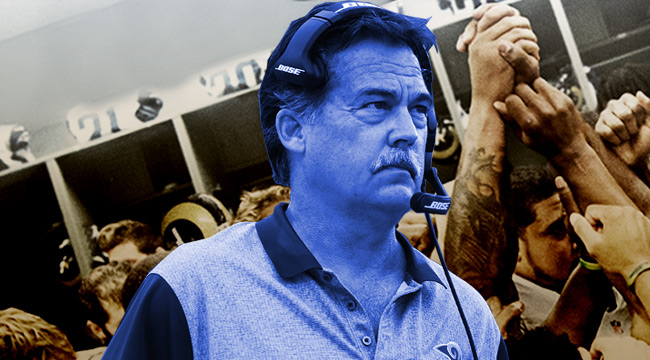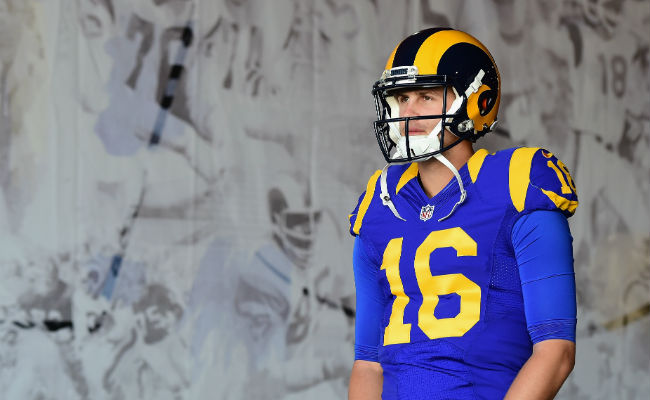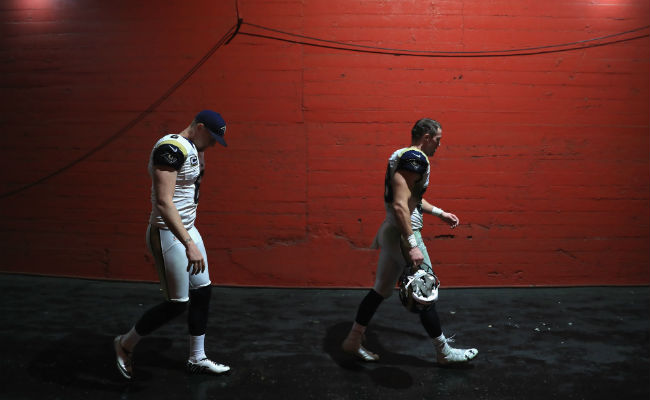
NFL Films flexed its football documentary muscles in 2015 with All Or Nothing, an Amazon Prime series that chronicled the Arizona Cardinals as head coach Bruce Arians led the team to a 13-3 record and a trip to the NFC Championship game. It was the first time an NFL team had allowed cameras to closely follow a franchise throughout a season, and the result was a unique look at how NFL teams operate. It also created a unique challenge for NFL Films — can a show with its ending already known to everyone watching still make for compelling television months later?
All Or Nothing’s second season, however, would certainly test the limits of that very question. This season followed the Rams, a team in turmoil from the very beginning. The franchise relocated, picking up from St. Louis and moving to Los Angeles. Head coach Jeff Fisher and the Rams soon found themselves working out of a temporary facility in Thousand Oaks, California, and the team struggled on offense and in the press.
A former Rams great publicly clashed with Fisher after he told him the franchise would not welcome him at games while he criticized the team. The organization took a daunting trip to London to play a game after moving across the country just months earlier. And Fisher was famously fired after getting a contract extension weeks earlier. The season was a disaster, but the show was far from it.
Episode six — called “The Winds of Change” — chronicles the firing of Jeff Fisher after the Rams guaranteed themselves another season with a losing record. It’s the season’s best episode because the show itself is built around it. The first episode of the season starts with a supertease, which is rare for a documentary, as Fisher walks into a player meeting with and delivers the news of his firing to the team.
“We’ve had some great team meetings over the years,” Fisher says while a Christmas tree glows in the background. “This is one you’re probably going to remember. Because I’m no longer your head coach.”
That’s how the show starts, and the journey the Rams take from setting up shop on the West Coast to the stunned look of his players is covered over the next six hours of television. It wasn’t the direction the show’s producers expected to take this season, but it ends up being a valuable audible for “All Or Nothing.”
“We knew that was going to be the heart of the series,” All or Nothing showrunner Keith Cossrow. “The moment the story would climax and fall away from.”
Cossrow has worked with NFL Films for 20 years, and he’s seen a lot. But as the losses mounted for the Rams and the footage inside the locker room and team meetings piled up in kind, the show became less about a dysfunctional offense or snakebit defense and more about a study in failure in the NFL.
At its heart, “All Or Nothing” is a fascinating look at everything that ails a struggling football team. And while a mediocre or bad record is more common than a good team in the NFL, each story is different. For the Rams, Todd Gurley struggled to get going all season, quarterback Case Keenum started over rookie and first overall pick Jared Goff, who was left waiting in the wings most of the year. Opposite that dismal offense was a strong defense that battled injuries and dealt with the stress of losing close games due to general offensive ineptitude.

By Week 12, Goff was the starter and he, too, struggled. A fitting bit of imagery for the Rams’ failures comes in the form of footage from a windstorm that interrupted practice, toppling goal posts on wheels at the temporary practice field. Series narrator Jon Hamm described the difficulties of coaching changes in the NFL, pointing out staff members like defensive coordinator Gregg Williams who has been fired as a head coach at previous stops.
“I’m not f-cking going 7-9,” Fisher famously said on Hard Knocks, which NFL Films also makes. It was another Fisher line they explored in the series’ first episode. But because the show started in medias res the audience already knows the futility with which the rest of the season will unfold.
The character study of Fisher here is interesting. It’s not that he’s a bad guy. He cares about his players and his staff. A certain level of failure is inevitable in the NFL, but eventually it becomes too much to justify.
That doesn’t mean anyone ever expects to get fired, though.
“It’s a frickin shock,” Fisher said in a meeting with his coaching staff shortly after he is terminated. “I’m sorry I let you guys down. You guys busted your ass every single day for me. I’m sorry.”
The coaches look stunned until Mike Singletary, the former San Francisco 49ers coach who was fired after two seasons, walks up to Fisher dramatically to shake his hand and say “thank you.”
Fisher says he will help his staff however he can. Because while only he departs today, it’s very likely the rest of his staff is let go at the end of the season. After Fisher is done speaking, more handshakes are exchanged. So are hugs, with the biggest coming from Fisher’s son, Brandon, who coached the defensive backs for the Rams.
“We all thought the emotion of it is so important to all of our understanding of these people’s relationships and the life they’re living. How committed they are to each other, how much they put into it,” Cossrow said. “To understand that it didn’t work out and now the fallout has arrived. And I think one thing they understand is that it’s not just coach Fisher that got fired, it’s the whole coaching staff. There’s a lot of dead men walking in that room now.”
And then comes the time to tell the players. The room is stunned. The silence is overwhelming. But Fisher implores the team to keep going.
“I want you guys to do me a favor: finish strong,” he said. “This becomes the end of my legacy here. I’m sorry if I let anybody down.”
Fisher gets a standing ovation from his players. In the background of the shot, the word “victory” in the team’s Victory Wall was missing its V. Fisher’s firing came a day after a 42-14 blowout loss at home to the eventual NFC champion Atlanta Falcons. The loss was the 165th of his career, tying Dan Reeves for the NFL record for most losses by a coach.
After Fisher leaves the room, the players stay behind to reflect on what happened. Many blame themselves. It’s quiet and tense, but those that speak do so with passion. An emotional Johnny Hekker stood and addressed the team. Crying, the punter on a 4-9 team apologized to everyone for not being better.
“He gave us every opportunity to succeed,” Hekker said. “And we didn’t hold each other accountable.”
Cossrow said few edits were made to this scene, and they didn’t cut anything they thought might embarrass the players. The cameras kept rolling, and in that moment no one was concerned about footage that wouldn’t be aired until months later.

“I think it’s an inspiring moment, an emotional moment that really gives us a different understand of what life in the NFL is,” the showrunner said. “Those are the kind of moments that we’re here to capture and document and present to the world and give it as much authenticity as we can.”
A few other coaches spoke—including Brandon Fisher—until finally, the meeting breaks up. Because they have another one at 12:30. Fisher is gone but life in the NFL must go on.
The lone appearance of a Rams executive in the episode happens when Kevin Demoff, Executive Vice President of Football Operations, addresses the team to tell them that special teams coach John Fassel will be the interim head coach. In the next episode, Demoff appears again to talk to Fassel about the franchise and how to operate as head coach.
Many have pointed out that NFL Films cameras did not show Fisher himself getting fired. Some in the media openly wondered if NFL Films was protecting Fisher, or if the Rams didn’t want it shown on television. But Cossrow said the simple truth is they just didn’t get it on film.
“There’s just some stuff we didn’t capture,” Cossrow said. “We did not capture Kevin Demoff and Stan Kronke deliberating whether to fire coach Fisher. If we had captured that, we would have used it.”
There are other reasons, of course. The Rams front office operated out of a different facility than the team’s temporary practice site in Thousand Oaks. And stylistically, the show’s producers thought it would have been strange to pivot away from the familiar faces we saw all season just to fire the guy the entire show has focused on.
“That’s who the story was about,” Cossrow said of Fisher. “So it made sense from a narrative standpoint that that’s what the episode would be about.”
Cossrow said the criticism has been valid and he’s not surprised by the speculation, but the stylistic point is an interesting one. “All Or Nothing” is a football story, and one that’s compelling despite the football being quite ordinary. But that’s because it humanizes football in a way that just watching games on Sunday as a fan cannot. The superhuman skill level necessary to play the game creates a distance between fans and players because the people wearing jerseys and carrying clipboards often seem beyond the ordinary people in the stands.
Amazon hasn’t officially said if there will be a Season 3 of “All Or Nothing,” but it’s clear the show can be compelling regardless of the team’s final record.
“We knew that this was a big ask to say ‘Hey let’s all go spend 8 hours watching a show about a team that went 4-12 and didn’t score a lot of touchdowns.’ That’s not something that on its face is particularly appealing and we knew that was a challenge,” Cossrow said. “But at the same time we also knew because of everything that happened because of coach Fisher and the team that this was an opportunity to tell a great story that hadn’t been told before.”






